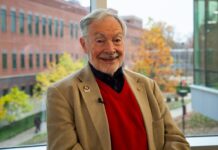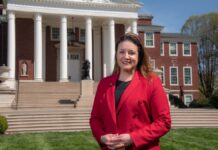
Mallika Sabharwal has been named one of four students in the first cohort of UofL Health and Social Justice Scholars. As an undergraduate student at the University of Florida, Sabharwal volunteered at the Equal Access Clinic, a student-run free clinic providing medical care to underinsured communities in North Florida.
Before starting medical school, she worked at the Chicago Department of Public Health through the CDC’s Public Health Associate Program. In Chicago, Sabharwal worked in the school-based sexually transmitted disease program, which educated and tested high school students on the south and west sides of the city. She is a second-year student in the UofL School of Medicine and serves as public health coordinator for the national American Medical Student Association.
UofL News had the opportunity to talk to Sabharwal about what motivates her and her objectives as a Health and Social Justice Scholar.
UofL News: What motivated you to invest in health and social justice?
Sabharwal: My family and I immigrated to Florida from India. My dad struggled with mental health disorders and we lived in a rural area so he didn’t always have access to the care he needed. There also were linguistic and cultural barriers besides economic barriers. Seeing him struggle with medical care and how it affected my family motivates me to improve health care access for everyone.
UofL News: Describe one experience that drives you to make a difference.
Sabharwal: When I was an undergrad, I volunteered at a student-run clinic. We often would see patients who were underinsured or homeless – underserved populations. I found it ironic that in health care you learn so much about people yet they are just there for a medication. We can give them a prescription for that medication, but there are so many underlying barriers that affect their health. I feel like I am in a position to address those other barriers.
I remember one woman specifically. I was doing intake on her, just going through the motions, and when I came to address, she said, ‘I am homeless.’ I was just … ‘sorry.’ I didn’t even know how to react. She needed a blood pressure medication refill. As a physician, I feel like I can give you your blood pressure medication, but I can also refer you to public housing or a social worker who can help you find housing besides just giving you the blood pressure medication.
UofL News: What would you like to accomplish as a Health and Social Justice Scholar?
Sabharwal: I would like to build a skill set that allows me to better articulate on issues of health disparity and health inequity. I also hope to create a project that the community can adopt and sustain beyond the program.
About the Health and Social Justice Scholars program
Introduced in the spring of 2016, the Health and Social Justice Scholars Program engages professional students with local communities and faculty mentors to bring about changes to benefit underserved populations in the Louisville area. The students will participate in public service projects and mentored scholarship to learn techniques for working interprofessionally and with community members to combat issues such as youth violence, public water safety and depression in adolescents in West Louisville and other disadvantaged communities.
Health and Social Justice Scholars are selected during the second year of their professional program at the UofL Health Sciences Center and are expected to remain scholars for three years. They receive annual financial support of $10,000 toward educational expenses.
For more information, visit Health and Social Justice Scholars.






























